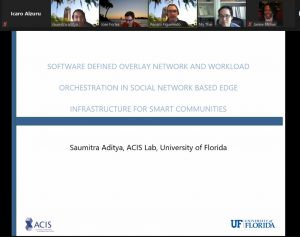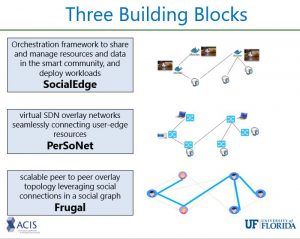
Congratulations to Saumitra Aditya, ACIS Lab’s most recent PhD graduate who defended his dissertation on “Software Defined Overlay Network and Workload Orchestration in Social Network Based Edge Infrastructure for Smart Communities” on July 15th, 2020 at 12:00 noon. He was a Graduate Research Assistant under the guidance of Dr. Renato Figueirdo at the University of Florida. His interests lie in edge and cloud computing, smart communities, software defined networking, resource orchestration and virtualization.

 Abstract:
Abstract:
This dissertation addresses key distributed computing and networking system challenges in realizing an edge cyber infrastructure for community-based collaboration in smart communities with contributions along three thrusts:
1) Frugal, a novel distributed mechanism to create a scalable peer to peer overlay topology leveraging social connections from an online social network graph. Frugal enables devices bound to social network users to make co-operative, but independent decisions to select social links to be mapped to overlay links. Frugal leverages heuristics to compute degree constrained minimum spanning trees and is novel in how it applies costs to social connections using only local neighborhood
information at every node to identify high value social connections for the mapping. Frugal can achieve significant reduction in the number of overlay links created by devices mapped to users with high social degrees without incurring major degradation in connectivity or performance loss in the resulting overlay network.
2) PerSoNet, a novel Layer-2/Layer-3 virtual private network (VPN) that a) automatically creates and manages private, authenticated overlay links across personal devices of social network peers, and b) automatically manages software-defined networking (SDN) rules in software switches for packet forwarding, name resolution and mapping (for IP addresses and DNS names), and device network access control. PerSoNet abstracts away complexities to self-organize a VPN that exposes IP/Ethernet network semantics, thereby enabling existing applications and middleware to be used in community-based fog/edge systems.
3) SocialEdge, an edge orchestration framework that a) leverages online social network for bootstrapping and permissioned block chain for information assurance, b) exploits recursive containerization for enabling secure data access, ensuring only intended workloads are run and enforcing fine-grained resource control, and c) leverages components from Kubernetes to instantiate and manage an ephemeral cluster composed of volunteered resources. SocialEdge models the problem of orchestrating the on-demand data processing infrastructure under data access constraints as a variant of the multi-commodity flow problem, and is the first edge orchestration system that combines recursive containerization with Kubernetes to support volunteer computing in the context of smart communities.